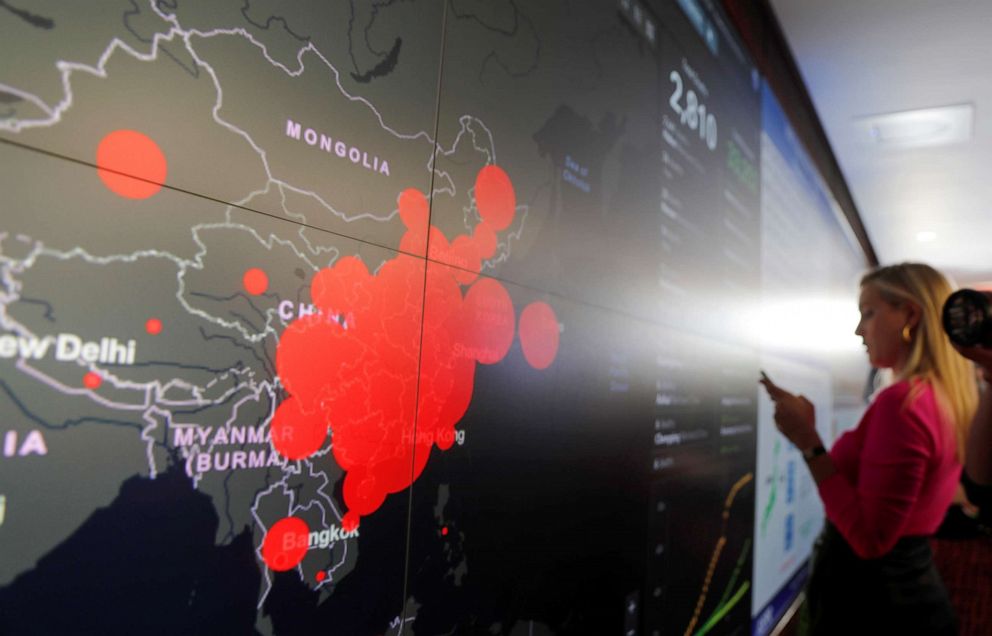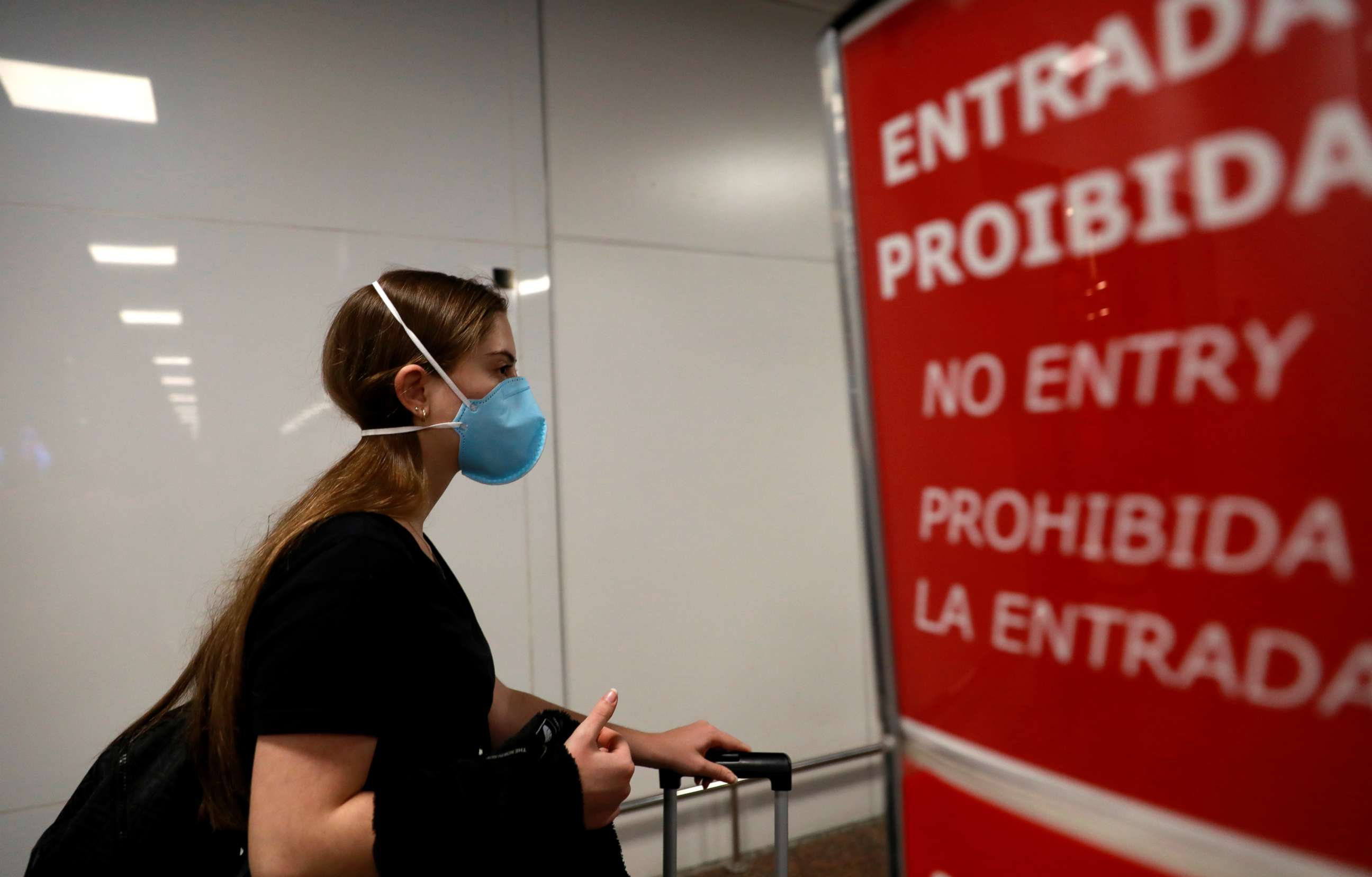Growth of new coronavirus fuels questions over definition of pandemic
The WHO has so far resisted labeling COVID-19 a pandemic.
As the coronavirus continues its spread around the globe, a single word is coming from the mouths of experts at an alarmingly growing rate: pandemic. But what exactly is a pandemic and does this qualify?
First, it's important to realize coronaviruses are actually a group of respiratory diseases and we've seen them spread from China to other countries previously. The new disease, now called COVID-19, originated, like many other coronaviruses, in an animal. While coronaviruses in animals usually don't cause humans many problems, when the virus manages to spread from animals to a human, and then rapidly among many people, there can be global consequences.
Initially, only people in Wuhan, China, -- where COVID-19 originated -- were infected. Now, the illness has been found in 37 countries around the globe, including the United States, and cases of COVID-19 are appearing without a known source of exposure, according to the Centers for Disease Control and Prevention.
"The fact this virus has caused illness -- including illness resulting in death -- and sustained person-to-person spread is concerning," Dr. Nancy Messonnier, the director for the National Center of Immunization and Respiratory Diseases at the CDC, said in a briefing Wednesday. "These factors meet two of the criteria of the pandemic."
Generally, the third criteria for a pandemic is worldwide spread.
"For the moment, we are not witnessing the uncontained global spread of this virus and we are not witnessing large scale severe disease or deaths," Dr. Tedros Ghebreyesus, the director general of the World Health Organization emphasized earlier this week.

But on Thursday as more and more nations reported new cases, Ghebreyesus warned, "No country should assume it wouldn't get cases. That could be a fatal mistake, quite literally. This virus does not respect borders. It does not distinguish between races or ethnicities." Once again, warning "This virus has pandemic potential."
For now, the WHO is still referring to the COVID-19 situation as an outbreak or epidemic that has the potential to become a pandemic.
Dr. Robert Glatter, an emergency physician at Lenox Hill Hospital in New York, agreed, stating, "I believe that we are on the brink of a global pandemic at this time, with cases now on six of seven continents, and only sparing Antarctica."
In 2003, another coronavirus, called severe acute respiratory syndrome, or SARS, originated in a bat and eventually spread to humans, infecting people in Asia. The SARS outbreak spread to more than 20 countries in North America, South America, Europe and Asia before it was eventually contained. The WHO never officially declared it a pandemic.
Dr. Eric Cioe-Peña, director of Global Health at Northwell Health in New Hyde Park, New York, has a different take on the new coronavirus.
"By the strictest definition of a pandemic, this meets it," he said. "Any type of activity that is higher than normal background disease activity that crosses the world is a pandemic. I think we're there."

Calling it a "pandemic would be admitting we cannot stop it," he said, which might explain public health officials' reluctance to use the "pandemic" label. He predicted that the CDC would probably call it a pandemic soon because more cases will be coming to the U.S. and "we're going to have to deal with it."
The U.S. currently has 60 cases, but 45 can be attributed to passengers on the Diamond Princess cruise ship, previously docked in Japan, and repatriation flights from China.
While this may be concerning, the CDC says it has been preparing for pandemic circumstances. The "Community Mitigation Guidelines to Prevent Pandemic Influenza United States 2017" outlines what can be done at both the individual and community levels during a pandemic when there is no vaccine yet. While the guidelines were initially geared for an influenza pandemic, the CDC is adjusting its recommendations to address COVID-19 specifically.
It's not clear what the practical implications would be if the CDC or WHO declared a COVID-19 pandemic. There are no immediate policy or financial strategies that are automatically triggered once something is declared a pandemic.
COVID-19 has already been declared a public health emergency by the WHO and the U.S. government.
The bottom line is that while COVID-19 hasn't yet been declared a pandemic, if it does become one, public health officials are asking Americans to be prepared.
ABC News Chief Medical Correspondent Dr. Jennifer Ashton says to prepare for the worst and hope for the best.
"Prepare as if there were a severe storm coming. Have extra food on hand. Make plans on how to take care of your loved ones. Prepare yourself mentally," she said.
Despite the rapid spread around the world, many of the confirmed COVID-19 illnesses have had mild symptoms.
"Most people who get novel coronavirus are going to stay at home," Health and Human Services Secretary Alex Azar said. "They are going to treat it how they would treat a severe flu or cold, managing symptoms, and we will publish clear information [about] when you should seek medical attention."
Angela N. Baldwin, M.D., M.P.H., is a pathology resident at Montefiore Health System in the Bronx and a contributor in the ABC News Medical Unit.



